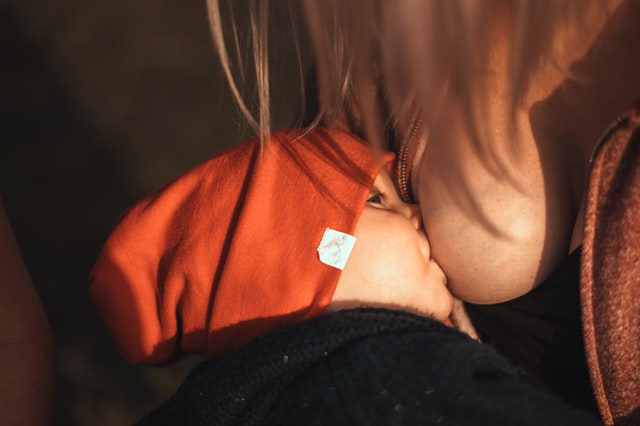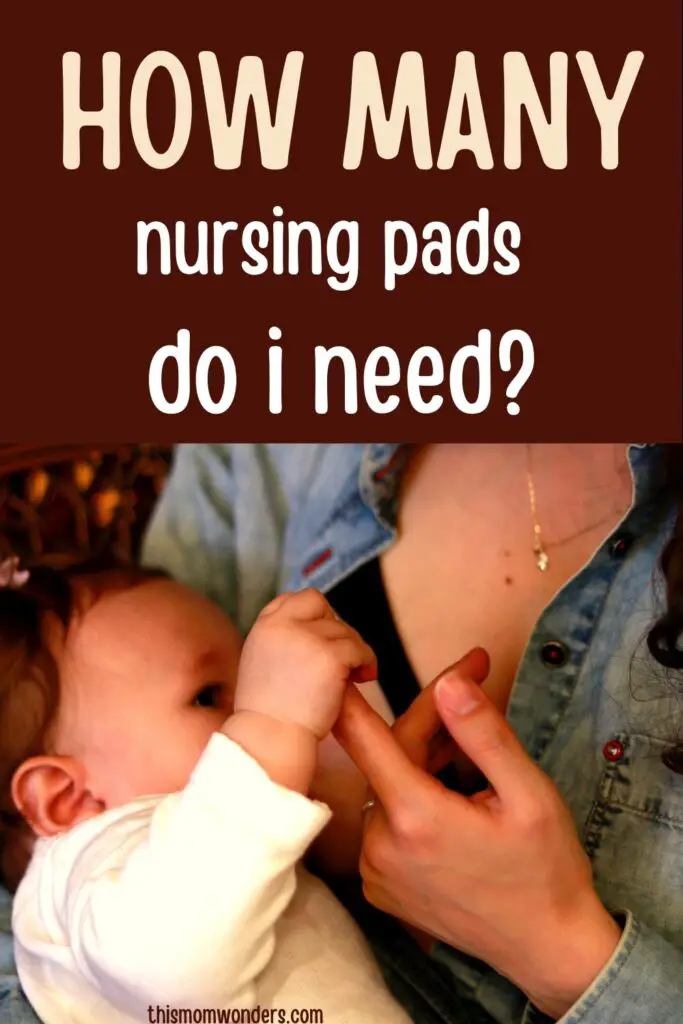How Many Nursing Pads Do I Need?

How many nursing pads do I need? The majority of women will need nursing pads in the early breastfeeding stages. You will likely experience leaking before your milk supply adjusts to the baby’s demands.
Some women never deal with leaking at all. However, others have to contend with breast milk leaking for the entire breastfeeding journey.
Factors That Determine How Many Nursing Pads You Need
The amount of leakage you have
How many nursing pads you need will depend on how much milk you are leaking. Right after birth, you may require a few pads because you still haven’t established steady milk supply.
However, once you and your little one learn how to latch correctly, you will need more breast pads.
I leaked A LOT with both of my babies and changed 4-6 times per day at the start. Then gradually, it went to 4 times a day.
SEE ALSO: Does Breastfeeding Make You Tired and Weak?
Absorbency
This largely depends on an individual. While I found disposable breast pads super absorbent, my friend swears by washable breast pads. Super absorbent pads will help you go for longer periods between changes.
The type of nursing pads you are using
The type of breast pad you choose to wear matters to a large extent.
If you are using both the disposable or reusable ones, you need to have extra ones in your bag for changing. I found the reusable ones to be totally useless as they leaked through my clothes.
I wouldn’t recommend them for a heavy leaker. You can take your chances if your chances if you are a light leaker.
Types of nursing pads
When buying breast pads, you will need to choose between these two types:
- Disposable
- Washable/Reusable
Whatever type you choose, it all depends on you. There are arguments for both, and as much as the washable ones contribute less to rubbish piles and are cheaper, they were not practical for me.
You may find a combination of both nursing pads a better idea. When at home, use the washable ones and save the disposable ones when at work or outside.
The pads, either the washable or disposable ones, will cling to your nipples as you are removing them.
It may even be a little painful to pull them out, especially when you leave them on for too long. It’s essential to change your pads often to avoid such occurrences.

How Often To Change Breast Pads?
You should change your breast pads every 3-4 hours. With such a frequency, you will need about 6 pads daily. However, this is not cast on stone.
If you are a light leaker, you may not have to change as frequently. Another factor that will determine how often to change pads is their absorbency level. The rule of the thumb is to change nursing pads as soon as they get wet.
As much as saving money may be your priority after giving birth, you do not want to leave breast pads too long. Not only will you smell bad, but you may end up with a bacterial infection.
Can I Get Yeast Infections From Using Nursing Pads?
Sadly, nursing pads can be a cause of yeast infections. It is critical to change your pads immediately they become wet.
Yeast thrives on warm and humid conditions, and by wearing a damp nursing pad for long, you will be providing a conducive breeding environment.
To cut back on the risks of infections, keep the breasts dry and clean.
Will I Always Need To Wear Breast Pads?
A lot of women only have to wear nursing pads in the early stages of breastfeeding. However, some women will leak lightly while others will leak heavily.
With time, you will be able to understand your body and what triggers the leaks. This will help you determine when to wear breast pads and when not to wear them.
Can I Reuse Disposable Nursing Pads?
No. Not only do you increase your chances of getting infections, but you will likely end up smelling sour. No one wants to be anywhere near a person that smells horrible!
How Many Nursing Pads Do I Need?
You will need 6 nursing pads in a day. It’s also a great idea to buy several brands with different shapes, sizes, and absorbency when you are starting to identify the best type that works for you.
Still, several other factors can influence the number of nursing pads you have to use, and this solely depends on every mother.
Are Nursing Pads Safe?
It’s only natural for any mother to ask this question. Breast pads will come into direct contact with their skin, and one needs to know whether what they are using is safe for them and their baby.
The good news is that when used appropriately, nursing pads are safe.
Change them when they get wet to prevent moisture around the nipple, which can cause thrush. If you are using reusable breastfeeding pads, wash them thoroughly with vinegar, and sundry them were possible to kill any bacteria.
If you notice you are getting recurrences of thrush infections, then your reusable breast pads may be the culprits. Yeast can live in fabric for long, and you may have to discard those to get new ones.
Some women may get irritation on the nipples when they use nursing pads. This is usually a minor problem. If you are experiencing nipple irritation, nipple creams can help alleviate the discomfort.
PIN FOR LATER

What To Look For In Nursing Pads
When it comes to buying breastfeeding pads, there are several things to consider irrespective of whether you go for washable or disposable pads. Here some important things to look out for.
Comfort
These tiny pads are going to be part of your life for a while now. You will wear them all day and night, so ensure they are comfortable. It may be challenging to pick a pad that’s comfortable immediately, so I suggest buying 2-3 different brands and trying them.
Absorbency level
A highly absorbent breast pad means you will go longer between changes. Longer times between changes means you will spend less money on breast pads.
Coverage
For moms with large breasts, buy nursing pads that are large enough to cover the areola area. A well-fitting pad is also less noticeable beneath your clothing. It also ensures there are no leakages.
Material used
Should you choose to go for washable breast pads, pick those with a soft material to provide you with the needed comfort. Also, the pad should fit your exact cup size of the bra. It may take a few trials and errors before you settle on the perfect ones.
By all means, keep off breast pads entirely made of plastic material because they prevent air from circulating in your breast. The best materials for nursing pads are cotton, bamboo, or performance fabrics such as mesh.
SEE ALSO:Can Babies Have Cold Breast Milk?
How Many Breast Pads Should I Pack For The Hospital Bag?
During the first couple of days after giving birth, you probably won’t leak. But don’t take my word for it. We all are different.
Pack 20 pieces of disposable nursing pads in your bag just in case you need to use them. The disposable ones are convenient while in the hospital as you simply toss them out when you are done.
Can I Wear A Nursing Pad Without A Bra?
You can use to wear silicone breast pads. These are not absorbent; instead, they prevent the breast from leaking by applying pressure on it. If you need to dress up and your dinner gown is fancy, silicone pads will come in handy.
Still, if you usually go braless, you can also go without one while breastfeeding. Wear maternity tank tops with a built-in shelf bra to hold your nursing pad in place. (amazon link)
Conclusion
For you to answer the question of how many nursing pads do I need, you have to consider several factors, as we have outlined in our article.
Whether you will be going for disposable or washable pads, the most important thing is to change breast pads regularly to prevent irritation and any infections.
For the mom who swears by disposable nursing pads, the Lansinoh Stay Dry Disposable Nursing Pads and the Medela Nursing Pads are the best. And or the mom who prefers the reusable breast pads, the Bamboobies Nursing Pads are affordable and convenient.
- What is a receiving blanket?
- Bible Verses for New Moms That Are Inspiring
- The Best Middle Names for Mateo That Pair Perfectly
- Can Humans Use Dog Shampoo?
- Unique Middle Names for Aden That Are Just Perfect